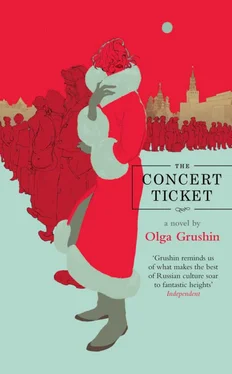“There,” he said aloud when he was done. “My contribution to humanity, my immortality.” He considered adding a short yet expressive word, but the glass felt brittle and icy in his gloveless fingers, and in any case, there was no room. He tossed the jagged piece into the snow and rose, and drifted through the city.
A few streets away, men were unloading large crates from a truck, slapping their padded gloves together with halfhearted grunts; he stopped and looked until one of them shooed him away. The movie theater was just around the corner, so he walked there next. The deserted foyer smelled of damp shoes and stale cigarettes growing in spittoons. He read the announcements on the wall, though without much interest: they had been running the same two features since November—a documentary called The Anvil of Righteousness and a historical epic, whose poster depicted three fierceeyed, bare-chested slaves trampling into marbled dust an effeminate degenerate in a jeweled toga. He had seen neither film; he never had the money. He was just tilting his head sideways, studying a potentially promising toppled statue in the poster’s lurid background, when the double doors groaned open, and there dribbled out a few people who had attended the matinee. He peered hopefully into their faces as they stumbled past him one by one; sometimes, if he caught them at the precise instant when they stepped squinting into the pale wintry light from the theater’s shadows, just before they adjusted their expressions, buttoned their coats, and trudged off toward the rest of their day, he was able to see their faces naked, split open like ripened fruit—and in their eyes, raw and urgent, unhappiness, or loneliness, or yearning. Catching such glimpses gave him brief comfort—he felt less alone. Today, though, the six or seven women who emerged into the foyer looked merely tired. One of them dragged a reluctant little boy by the hand; another yawned, and paused, and glared.
“What are you gawking at?” she snarled.
Alexander moved off.
The pet shop across the road, another one of his haunts, turned out to be locked, a sign on the door stating, tersely and indefinitely: Closed for accounting . He pressed his nose to the dim window, trying to discern, in the gloom beyond, the enormous, dusty aquarium in which, he knew, lethargic, bleary-eyed fish were pushing through the faintly illuminated water as through thick jelly; but it was rather like peering inside a bottle of dense brown glass. He gave the door a cursory kick, then cut through an alley, crossed a courtyard, swung into a street with a kiosk at one end. He had passed here before; the kiosk never seemed to be open, yet it always had a line before it. Lines depressed him, and he strode past with quick, determined steps, debating whether to make a trip to his favorite place of all before evening fell—a place that was breathing, throbbing, heaving on the other side of the city, a private place he had sworn never to share with anyone—when someone called his name. The name was common, so he took a few more resolute steps, and heard his name again. Looking up, he saw an aging woman in a lopsided coat, with a round face and unevenly drawn eyebrows, waving at him from the thick of the line.
It took him a second to recognize her as his mother.
He wondered whether he could just keep walking, but it was obvious that she had seen that he had seen her. “Ah, Sasha, how good that you happened by!” she exclaimed, even before he approached. Her tone was unnatural, too cheerful, too loud; as she spoke, she half turned to someone behind her, though not addressing anyone exactly. Out of the corner of his eye, he saw fur and glitter, but did not care to look closer.
“What are they selling?” he said sullenly. “Tablecloths? Curtains?”
“No, not—I don’t actually…” Her voice dipped lower. “Why? Do you think we need new curtains? In the bedroom, maybe? Have you noticed that hole? I mended it, but maybe it’s—”
“Our curtains are fine,” he said.
“Well, anyway, it’s lucky you came by, I just remembered I haven’t yet ironed your father’s shirt for his important performance tonight ”—she pronounced the words in that same unnecessarily loud voice, her head turned to the side—“so I must run home, but you won’t have to wait long, no more than an hour, perhaps only forty—”
“I’m busy,” he said.
“Oh, I’ll be right back, half an hour, no longer. Here, take this, just in case. I don’t want to lose my place, I’ve been here two weeks, it’s supposed to reopen any day now, but of course not in the next twenty minutes. Just wait for me to get back, a quarter of an hour, all right?”
He looked at the wallet she had pressed into his hand.
“Fine,” he said. “Fine. Don’t rush.”
Not that he was going to take any of their money, of course, despite the fact that they never gave him anything and surely owed him by now—no, he wouldn’t even check how much there was, not until she rounded the corner—and not then either. He stuffed the wallet in his pocket and stood staring into space. After a while, the air abruptly grew a shade grayer, as if some giant fish in the cloudy waters over which the skies were sailing had flipped belly up, turning toward him its darker back. Snowflakes began to scratch his exposed face, hands, neck with tiny needles of wetness. “About time!” a voice shrieked ahead.
Emerging from his trance, Alexander peered into the drifting snow.
The kiosk shutter had been lifted, its insides lit. He saw the top of a woman’s head bent in the window. Oh great, he thought, and I don’t even know how many napkins Mother wants or whatever; but, since the circumstances seemed to call for it, he pulled the wallet out anyway, and glanced inside—and was startled to find a handful of large bills, more than he had ever seen at once, two months’ salary at least, he estimated, holding his breath now.
“Can anyone tell me what the devil they’re selling?” a man’s gruff voice asked in his ear.
His face hot, Alexander snapped the wallet shut. “No clue,” he muttered, turning.
The man was his father’s age, dressed in an oversized torn jacket, his chin unevenly sketched out with stubble, his right cheekbone slapped with the shadow of an old bruise.
“Hold my place, will you,” he said happily, sending an exhalation of mingled drink and sweat toward Alexander, and ambled off.
“Thinks he’s smarter than everyone else, that one,” someone threw after him with disapproval. “Better men have tried and failed.”
The line was already contracting, gathering itself, rearing up like a caterpillar about to creep forth. Alexander waited, clutching the wallet tightly. People shuffled forward one by one; he could now make out, in the glare of the lightbulb, the darkening roots of the kiosk woman’s bright hair. The afternoon was just beginning to vibrate with the aftershocks of some heated altercation at the kiosk window when the man in the torn jacket returned.
“Concert tickets,” he declared, and spat richly on the ground. “Can you believe it? All these fools have waited days for concert tickets! ”
The announcement dropped into the crowd, and a heavy, openmouthed silence settled on it. Then a chorus of troubled voices rippled through, widening like circles on the water.
“Concert?”
“Did someone say ‘concert’?”
“What kind of concert, did you hear?”
The man choked on a curt laugh. “Folk dancing, boot-slapping, waltzing, violin-trilling, it’s all the same to me, I’m not hanging around for some symphony. It’s freezing, my throat’s dry, I’m off to get myself something to warm up and cheer the soul. How about it, my friend?”
Читать дальше












